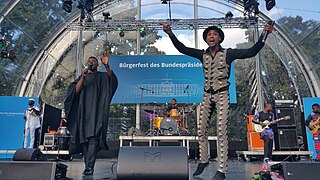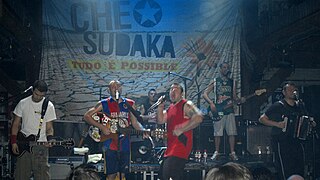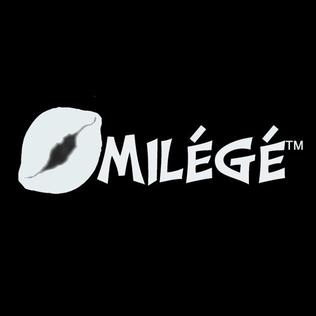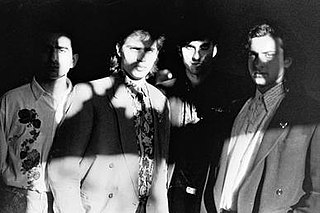 W
WAmadou & Mariam are a musical duo from Mali, composed of the Bamako-born couple Amadou Bagayoko and Mariam Doumbia (vocals).
 W
WLes Amazones d'Afrique is a contemporary world music supergroup formed in Mali in 2015 featuring Kandia Kouyaté, Angélique Kidjo, Mamani Keita, Rokia Koné, Mariam Doumbia, Nneka, Mariam Koné, Massan Coulibaly, Madina N'Diaye, Madiaré Dramé, Mouneissa Tandina and Pamela Badjogo. The name of the group refers to the Dahomey Amazons, which was a female elephant hunting group and a military regiment from the 17th century through the 19th century in what is now Benin.
 W
WBandista is a Turkish musical collective, formed in 2006 in Istanbul. The band is known for their diverse musical style, DIY ethic and leftist political stance.
 W
WBANTU is a 13-piece band based in Lagos, Nigeria. Their music is a fusion of Afrobeat, Hiphop, Afrofunk, Highlife and Yoruba music. The group features multi-instrumentalists and singers who perform as a collective.
 W
WBlack Theama is an Egyptian band that was founded in 2004. The band's musical genre covers a wide range of styles from Nubian rhythms, reggae, hip-hop, and R&B, to music with other African influences. Through their music, they sing to "celebrate the black experience in Egypt." According to Amir Salah, the band strives to maintain a sound true to the name they carry, which is unique, natural, and independent. Black Theama tries to create music that does not fall in line with the "standard pop-music cliches."
 W
WCesair is a Dutch band formed in 2008 who make pagan folk, world fusion and world music. They are the main representatives of the pagan folk music scene in the Netherlands, alongside pagan folk band Omnia. The band refer to their genre as “Epic Folk & Mythic Music”. They perform on a variety of modern and traditional instruments, including accordion, hurdy-gurdy, hammered dulcimer, Irish bouzouki, violin, cello, bodhrán and many others. Their songs are performed in a variety of languages ranging from Arabic, medieval Celtic languages, English, Latin, Greek, to Middle Dutch, Old Norse and more.
 W
WChe Sudaka is a four-piece band, composed of Argentinians and Colombians living in Barcelona. The band defines itself by its punk reggae party while using rhythms derived from hip-hop and ska.
 W
WFarid and Rami Chehade, who perform professionally as the Chehade Brothers, are Palestinian–Lebanese musicians and singers.
 W
WCimarrón is a Colombian musical group of festive dance music joropo from the plains of the Orinoco River. This Grammy nominated band makes latin music with its Andalusian, Indigenous American native and African roots. Their music includes four-stringed cuatro, harp, maracas, and also peruvian-flamenco cajón, brazilian surdo, afro-colombian tambora, a stomp dance as a percussion component and tribal indigenous whistles.
 W
WDilan Ensemble is a Kurdish Music Ensemble from Iranian Kurdistan or Eastern Kurdistan, which was established by the Kamanche player and composer Shahriyar Jamshidi in memoriam of Kurdish musician brothers Qadir Dilan and Muhamad Salih Dilan from Southern Kurdistan in 2003.
 W
WDjabe is a Hungarian jazz-rock band formed in 1996.
 W
WGalloping Wonder Stag is Hungarian music group, associated with world music, psychedelic folk, folk rock and shamanic music labels, continuing Galloping Coroners psychedelic music replacing electronic guitars and drums with acoustic folk instruments.
 W
WEl General Paz & La Triple Frontera (GP3F) is a rock fusion band founded by Anel Paz, integrated by musicians from various countries, that merges several rhythms in their songs, including Rock, Funk, Folklore of Latin America, Brazilian Music, Jazz, and World Music. The Afro-Latin Rhythms joined with a Rock-Funk sound, creates an original and unique proposal.
 W
WGorillaz are a British virtual band created in 1998 by musician Damon Albarn and artist Jamie Hewlett. The band primarily consists of four animated members: 2-D, Murdoc Niccals, Noodle, and Russel Hobbs. Their fictional universe is presented in music videos, interviews and short cartoons. In reality, Albarn is the only permanent musical contributor, and Gorillaz' music often features collaborations with a wide range of featured artists. Remi Kabaka Jr. became producer for the band in 2016 after several years providing the voice of Russel Hobbs and was listed as an official member alongside Albarn and Hewlett in the 2019 documentary Gorillaz: Reject False Icons.
 W
WGráda is a traditional Irish music band founded in 2001 whose members are a mix of Irish and New Zealand musicians. Gráda is based in Dublin and Galway, Ireland, but spent much time touring internationally. In 2006, Gráda played in 16 different countries. In 2011, members of Gráda disbanded to work on individual projects.
 W
WThe Harmony Chinese Music Group (和聲中樂團) is a Chinese music group founded in 2001 in Bandung, Indonesia. The group seeks to promote a wide variety of world music based on Indonesian culture using Chinese musical instruments, as well as exploring contemporary styles.
 W
WIrfan is an ethereal world music band from Bulgaria formed in 2001. Their sound is an original electro-acoustic world fusion influenced by the sacred and folk music traditions of Bulgaria, the Balkans, Persia, the Middle East, North Africa and India, as well as by the musical and spiritual heritage of Byzantium and Medieval Europe. The integrity of Irfan’s sound bears the depths of an audio-archeology that explores the lost prehistoric universal human musical heritage in the layers of time.
 W
WJunoon is a Pakistani sufi rock band from Lahore, Punjab, Pakistan, and Tappan, New York, formed in 1990. The band is directed by founder, lead guitarist and songwriter, Salman Ahmad, who was soon joined by keyboardist Nusrat Hussain, bass guitarist Brian O’Connell and vocalist Ali Azmat. Junoon is Pakistan's and one of South Asia's most successful bands; Q magazine regarded them as "One of the biggest bands in the world" and The New York Times called Junoon "the U2 of Pakistan". Since their inception, the group has released a collective total of nineteen albums: seven studio albums; one soundtrack; two live albums; four video albums; and five compilations. They have sold over 30 million records worldwide.
 W
WKako Band is an Iranian new-style integrative and vocal Fusion band. In 2013 Kako band produced and released its first album called Invite The band has also performed the soundtrack of the Iranian TV show Aspirin called Fall. They sing in idioglossia and/or conlang.
 W
WLemzo Diamono was a Senegalese musical group, well known in the 1990s. The group was mainly active from 1990 to 1998.
 W
WLúnasa is a traditional Irish music group, named after Lughnasadh, an ancient harvest festival. They tour and perform internationally, and have recorded a number of albums of both traditional and contemporary Irish instrumental music.
 W
WLa Mano Ajena is a Chilean band founded in 2002 that mixes rhythms from Eastern Europe, Latin America, France and Russia, blending all these sounds in a pastiche that also unites the tendencies of each member of the band: rock, punk, Latin American folklore and theater music. This musical project is unique in Chile, and its hybrid sound has been called "klezmer a la chilena" by press.
 W
WJosé Carlos Severino and Mário Bacelar are join in the Spring of 2004 and with them the Mediterrânic Ensemble, original World/Folk Fusion Music is born.
 W
WMekaal Hasan Band is an international sufi rock band formed in Lahore, Pakistan in 2000 by composer, singer-songwriter and guitarist Meekal Hasan.
 W
WMilege Afrojazz Band, commonly known as Milege, is a world music band from Uganda, made up of young talented musicians from Uganda whose enthusiasm is derived from the diverse cultural music traditions of the different tribes of Uganda into which they fuse contemporary elements to express the likeness of Uganda's people in a more current context. As of 2015 Milege's members are; guitarist Manana F. Birabi, vocalist Joanita Katushabe, lead vocalist Gloria Akugizibwe, bassist Paul Owembabazi and violinist Alison Nadunga as a seasoned member.
 W
WLa Musgaña is a Spanish folk music ensemble, founded in 1986 by Enrique Almendros, José María Climent and Rafa Martin. The band incorporates various instruments such as the dulcimer, fiddle, hurdy-gurdy, bagpipes, flutes, guitar and bass, and performs traditional music from the Iberian peninsula, mostly from the Spanish regions of Castile, Zamora, Leon, Extremadura and La Mancha. La Musgaña means "water-rat" in Spanish.
 W
WThe Naghash Ensemble is a contemporary music ensemble from Armenia featuring three female singers, duduk, oud, dhol and piano. They perform new music written by Armenian-American composer John Hodian based on sacred texts by the medieval Armenian mystic poet and priest, Mkrtich Naghash. Described as "The sound of ancient Armenia reinvented for the 21st century" by Armenian composer Tigran Mansurian, Hodian's "Songs of Exile" combines "the earthy spirituality of Armenian folk song, new classical music, contemporary post-minimalism and the energy of rock and jazz".
 W
WOrchestra Baobab is a Senegalese band established in 1970 as the house band of the Baobab Club in Dakar. Many of the band's original members had previously played with Star Band de Dakar in the 1960s. Directed by timbalero and vocalist Balla Sidibé, the group features saxophonists Issa Cissoko and Thierno Koité, two singers, two guitarists and a rhythm section with drums, congas and bass guitar. Since their formation, the band has predominantly played a mix of son cubano, Wolof music, and to a lesser extent Mande musical traditions.
 W
WOsjan is a Polish music band active from 1970 until 2012.
 W
WPandemonio is a Lombardian folk band. Since the year 2000 they have been recovering and rearranging traditional Italian folk songs with elements from other sonorous worlds such as bluegrass, country and Irish music. The sound is based on acoustic guitars, mandolin, flutes and the bowed psaltery colored with polyphony voices.
 W
WPanetoz is a Swedish multi-ethnic band with members originating from Gambia, Ethiopia, Angola, Congo and Finland-Sweden. Panetoz are now signed to Warner Music that released their biggest hit, "Dansa pausa". Their repertoire is made up of a mix of Swedish language, English and various African languages with influences from traditional African music and Swedish hip hop and R&B.
 W
WSen Svaja is a Lithuanian experimental post-folk and world music band from Vilnius, formed in 2010. The band consists of Dorotė Girskienė, Živilė Razinkovienė and Agota Zdanavičiūtė. Sen Svaja focuses on ancient Lithuanian folk songs and folk music worldwide, also integrating elements of oriental, Slavic folk and jazz music in their sound.
 W
WShakti were a fusion band formed by English guitarist John McLaughlin, Indian violin player L. Shankar, percussionists Zakir Hussain and T. H. "Vikku" Vinayakram in 1974. The band played acoustic fusion music which combined Indian music with elements of jazz.
 W
WSvetoglas - The Mystery of Bulgarian Polyphony is the first Bulgarian male voice formation for ancestral polyphonic music.
 W
WTanghetto is an Argentinian neo tango and electronic tango music project created and led by musician and producer Max Masri. Winner of the Gardel Award and three times nominated to the Latin Grammy Awards. It's based in Buenos Aires, Argentina.
 W
WTéada, an Irish band, plays traditional music. Téada is Gaelic for "strings". The five members of the band are fiddle player Oisín Mac Diarmada, button accordion player Paul Finn, Damien Stenson performs on flutes and various whistles, Seán Mc Elwain switches between the bouzouki and guitar and bodhrán player Tristan Rosenstock.
 W
WTheodor Bastard is a band, from St Petersburg, Russia. Theodor Bastard were pioneers of world and neofolk music genres in Russia. Also elements of dark wave, trip hop and ambient are present in the band's music. The themes of band's songs are very far from everyday problems, they are based on mythology and fantasy. The hallmark of the band is a female vocal by Yana Veva - the lead vocalist and author of many songs. She often sings in idiosyncratic language invented by her and in rare languages ranging from African and Asian to Native American and many more. Theodor Bastard albums were released in 5 countries: Russia, Germany, Turkey, Mexico, Argentina.
 W
WUrban Trad is a Belgian folk music group, consisting of both Flemish and French speaking people and a close connection with Galicia.
 W
WThe Villalobos Brothers, are a trio of violinists, singer-songwriters, composers, arrangers, and multi-talented instrumentalists. They have performed at the Latin Grammy Awards,Carnegie Hall, the Solomon R. Guggenheim Museum, the Metropolitan Museum of Art, the 60th Anniversary of the United Nations, the Rainbow Room at Rockefeller Center, the New York Mets field at Shea Stadium, and other historic venues.
 W
WVital Signs were a Pakistani pop and rock band formed in Rawalpindi in 1986 by two Peshawar University students. After their formation, they soon became Pakistan's first and most commercially successful as well as critically acclaimed act. The band's popular lineup consisted of keyboardist Rohail Hyatt, bassist Shahzad Hasan, guitarist Nusrat Hussain and vocalist Junaid Jamshed. Rooted in Rawalpindi with some influence from Western music during the conservative regime of President Zia-ul-Haq, the Vital Signs utilizes several genres, ranging from pop music to rock, and often incorporating classical and other elements in innovative ways. In the early 1990s, they came to be perceived by many Pakistani fans and country's cultural observers as a "promising new era of cultural revival". Their enormous popularity significantly opened a new wave of music and a modern chapter in the history of Pakistan.
 W
WWest Java Syndicate is an Indonesian ethnic-fusion music group founded in 2010 in Bandung, Indonesia. The group seeks to promote a wide variety of world music based on sundanese music using traditional sundanese musical instruments, as well as exploring contemporary styles.
 W
WThe Yoshida Brothers are Japanese shamisenist musicians who have released several albums on the Domo Records label.
 W
WZap Mama is the music act of Belgian artist Marie Daulne. Zap Mama sings polyphonic and afro-pop music, a harmonic music with a mixture of infused African vocal techniques, urban, hip hop with emphasis on voice. The worldwide success of Zap Mama, and an ensemble of female polyphonic singers, inspired influences in American hip hop, nu-soul, jazz and elements of pop. The evolving musical compositions created a diverse band of singers and musicians for Zap Mama.